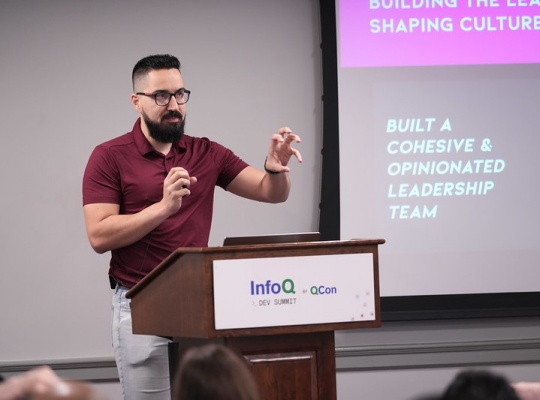Codetown
Codetown ::: a software developer's community
mike sorn's Likes
Notes
Welcome to Codetown!
 Codetown is a social network. It's got blogs, forums, groups, personal pages and more! You might think of Codetown as a funky camper van with lots of compartments for your stuff and a great multimedia system, too! Best of all, Codetown has room for all of your friends.
Codetown is a social network. It's got blogs, forums, groups, personal pages and more! You might think of Codetown as a funky camper van with lots of compartments for your stuff and a great multimedia system, too! Best of all, Codetown has room for all of your friends.
Created by Michael Levin Dec 18, 2008 at 6:56pm. Last updated by Michael Levin May 4, 2018.
Looking for Jobs or Staff?
Check out the Codetown Jobs group.
InfoQ Reading List
Presentation: Scaling to 100+ as a Director: Lessons From Growing Engineering Organizations

Thiago Ghisi explains the structural shifts required as an engineering org scales from 30 to 100+ engineers. He shares how to transition from managing performance to building opinionated leadership teams and shaping long-term culture. He discusses his "Three Levels of Impact" framework - Org, Skip-Level, and Company - to help leaders drive strategy and secure high-level promotions.
By Thiago GhisiPodcast: [Video Podcast] The Craft of Software Architecture in the Age of AI Tools

AI coding assistants promise speed, but what do they mean for quality, trust, and the architect’s craft? In this inaugural episode of Next Gen Architecture Playbook, Shweta Vohra and Grady Booch explore a principled view of how architecture must evolve when machines begin writing code alongside humans. They unpack the third golden age of software engineering, where productivity gains are real.
By Grady BoochCloudFront Adds Origin mTLS Authentication for End-to-End Zero Trust

Amazon CloudFront now supports mutual TLS authentication for origin servers, completing end-to-end zero-trust authentication from viewers to backends. The feature replaces IP allowlists and shared secrets with cryptographic verification, proving particularly valuable for multi-cloud deployments, where origins can verify that traffic originated from CloudFront without VPN tunnels.
By Steef-Jan WiggersArticle: From Prompts to Production: A Playbook for Agentic Development

In this article, author Abhishek Goswami shares a practitioner's playbook with development practices, that describes building agentic AI applications and scaling them in production. He also presents core architecture patterns for agentic application development.
By Abhishek GoswamiPandas 3.0 Introduces Default String Dtype and Copy-on-Write Semantics

The pandas team has released pandas 3.0.0, a major update that changes core behaviors around string handling, memory semantics, and datetime resolution, while removing a substantial amount of deprecated functionality. The release introduces several changes to core behaviors in the library’s API.
By Robert Krzaczyński
© 2026 Created by Michael Levin.
Powered by
![]()